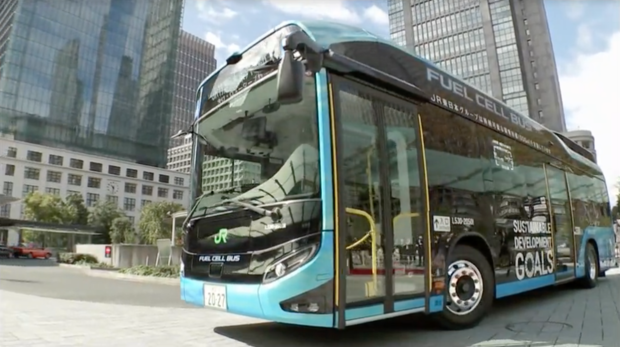On the road toward renewable energy, Japan is betting on hydrogen
Tokyo — The hydrogen-powered Toyota Mirai I'm test-riding in Tokyo's Odaiba district looks and feels like any other luxury sedan, and it's as silent as a hybrid or all-electric vehicle. But hydrogen vehicles remain exotic here in Japan, seven years after the Mirai launched.
There are only about 4,000 hydrogen cars on the road in the country today, which is just 10% of government targets.
A few miles away is a hydrogen refueling station, the usual noise and odor of a conventional gas station conspicuously absent. Tanks of liquid hydrogen are discreetly concealed behind the station's walls; the pump island is operated by an attendant dressed in a sporty red jacket. It takes just three minutes to fill the tank with 5.6 kilograms of pressurized gas.
"This is our busiest station," Takanori Okada, Iwatani Corporation's assistant general manager for public relations, told CBS News. "We get 40 or 50 customers a day on average."
Most are there to protectively top off their tanks, another employee tells me. Japan has only about 160 hydrogen refueling stations, concentrated in the country's three major cities. By comparison, there are about 30,000 gas stations across the country. Once every three months or so, a motorist ends up stranded, their tank empty, and they have to get towed. In addition to there being only a few vehicle models to choose from, which all have high sticker prices, the paucity of refueling infrastructure has turned consumers off.
But at the national level, no country in the world is more gung-ho about hydrogen as an energy source.
"I think the way I would characterize Japanese commitment to hydrogen is … unwavering," Keith Wipke, program manager for the National Renewable Energy Laboratory's Fuel Cell and Hydrogen Technologies Program, in Golden, Colorado, told CBS News. "Japan has had a long, long-term commitment to hydrogen."
Resource-poor, Japan began research on hydrogen after the 1970s energy crunch. The 2011 Fukushima nuclear plant accident and public anti-nuclear sentiment accelerated interest in hydrogen and other clean energies.
Last week, the government issued its carbon neutrality road map, doubling the share of renewables providing electricity, to as much as 38% by 2030, with nuclear supplying about a fifth; its hydrogen-ammonia fuel target was set at 1%.
Japan's placing multiple bets on hydrogen. With great fanfare, last year Japan opened one of the world's biggest "green hydrogen" plants, near the site of the Fukushima nuclear accident. It also unveiled the Suiso "Hydrogen" Frontier, the world's first liquid hydrogen carrier, in 2019. Tokyo has a fleet of hydrogen city buses. This year's Tokyo Olympic flame was fueled from hydrogen.
Wipke said that, while it took 40 years to make solar energy commercially competitive, hydrogen will have to make the same leap in just 10 years to become a viable resource
And not all hydrogen is created equal.
"The key thing to note here is, you know, hydrogen is as clean as how it's produced," Monica Nagashima, Japan country manager at InfluenceMap, told CBS News.
While the fuel itself doesn't emit carbon, most hydrogen produced today is manufactured using fossil fuels. The goal is to commercialize schemes for making hydrogen from renewables — "green hydrogen."
Japan's hydrogen dreams aren't driven just by resource scarcity and meeting climate goals, Nagashima said.
"Japan has lost its competitiveness to other countries in terms of production of solar panels or wind turbines, and hydrogen is seen as a sector where it could lead in the world," Nagashima said.
While Wipke isn't writing off hydrogen fuel cell cars yet — Californians own more more than 11,000, despite far fewer refueling stations than Japan — he said hydrogen is better suited to sectors like heavy industry and trucks.
"Heavy-duty 18-wheeler trucks, hauling 80,000 pounds down the road here in Colorado, going up in the mountains on a six-percent grade over 12,000 feet, and wanting to go, for example, from New York to LA with back-to-back drivers. One sleeping, one's driving," he said. "You can do that with hydrogen."
The global Hydrogen Council predicts hydrogen could provide 18% of global energy demand by 2050. Whether or not that's wishful thinking, Wipke argues the gas is here to stay.
"One thing that is emerging, without question, is that hydrogen is going to play a more important role in heavy-duty transportation, in long duration energy storage," he said. Industrial processes like steelmaking "are all going to be decarbonized through making green hydrogen."




